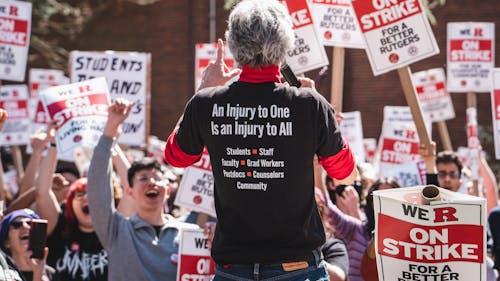EDITORIAL: Given nationwide faculty strikes, student journalists need clear ethics policies
How can journalists effectively report on issues that hit close to home?

As the University's independent student newspaper, The Daily Targum has had the privilege of covering Rutgers' first faculty strike in its 257-year history. While it is our duty as student journalists to report on and write about historic events such as this, we have been faced with a unique ethical dilemma.
As discussed in a previous editorial, journalists generally must maintain their distance from protests and demonstrations to remain as unbiased as possible. Yet this inevitably becomes increasingly difficult when an issue hits particularly close to home.
Our news reporters and editors have attended the strike demonstrations. They go out and interview students and faculty about their experience while trying to remain neutral — they ultimately cannot fully participate in the strike by marching or holding signs.
We have to be wary of what we post on social media as the Targum's name is attached to what we post, and a journalist does not want to risk their credibility by seemingly revealing their biases online.
On the one hand, this is part of the job. Student journalism gives undergraduates insight into what a career in journalism entails, and it is likely that a young aspiring journalist would start their career with local journalism, which means they may likely be reporting on issues that affect their own neighborhood.
While it can be frustrating and challenging, journalists must often remove themselves from an issue due to a potential conflict of interest, even though those covering events in their communities may be the most knowledgeable.
Because of these factors, journalists must tread carefully when covering events in their own communities. This is especially important as we live in an age of "fake news" in which people are particularly hesitant to trust the news.
Upholding journalistic standards can help restore people's faith in journalism, and it is important that journalism as a whole does not fall victim to increased polarization. This is why news outlets need to establish clear ethics policies when it comes to being a journalist and participating in protests.
For example, NPR's old ethics policy stated that its journalists should avoid "personally advocating for 'controversial' or 'polarizing' issues." It also noted that journalists should not attend "marches, rallies and public events." But this was changed in 2021, so NPR journalists would be permitted to participate in movements in the name of "the freedom and dignity of human beings," both online and offline.
This is essential for a number of reasons. Journalists are people outside of their job with their own beliefs and rights to protest that they should be able to exercise. While it will always be difficult for journalists to maintain boundaries between their work and personal lives, it is important that they are not silenced when it comes to issues that directly affect them.
Should journalists be expected to sit back when mass shootings are out of control? Should they have been prohibited from attending Black Lives Matter protests during the wake of George Floyd's death?
And in this specific case, the Targum's student journalists have personal relationships with their educators. They are members of the student body who are directly affected by how their education is funded. Are we expected not to attend protests that we personally have a stake in to maintain journalistic neutrality?
While we are able to voice our opinions in editorials, we could use more guidance when it comes to how we can or cannot participate in local protests, like many other news outlets. Student journalist organizations must be included in this discussion since we are also tasked with covering serious issues that affect us.
In addition to the Targum, UCLA's Daily Bruin was tasked with covering a faculty strike, as was The New School's Free Press in 2022. And unfortunately, student newspapers, including Michigan State's State News and the University of Virginia's The Cavalier Daily, have had to cover mass shootings on their own campuses.
And now, the University of Michigan's The Michigan Daily will be covering an ongoing strike on graduate workers.
Through more transparent ethics policies, society may become more comfortable with and more equipped to address journalists participating in protests. But regardless, journalists must be aware of how they take up space and should be held accountable by their respective news organizations and the public.
Sometimes, journalists can represent this group of rich, liberal elitists who can become the forefront of protests, consequently taking the focus away from local community organizers and activists who dedicate their entire livelihoods to these movements.
In this way, it is important that we continue to hold journalists accountable and make sure that they are not overstepping their professional boundaries or seemingly taking away from someone else's struggle. Yet at the same time, we must remember that journalists are people with their own views and rights to protest who should be able to participate in movements that directly impact them.
The only way we will be able to achieve both is by news organizations creating ethics policies that balance journalistic standards with the individual rights of journalists as citizens.
The Daily Targum's editorials represent the views of the majority of the 155th editorial board. Columns, cartoons and letters do not necessarily reflect the views of the Targum Publishing Company or its staff.



